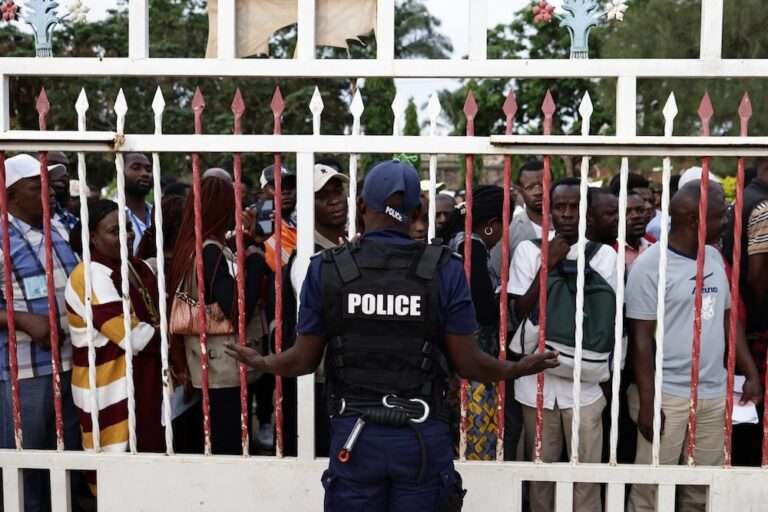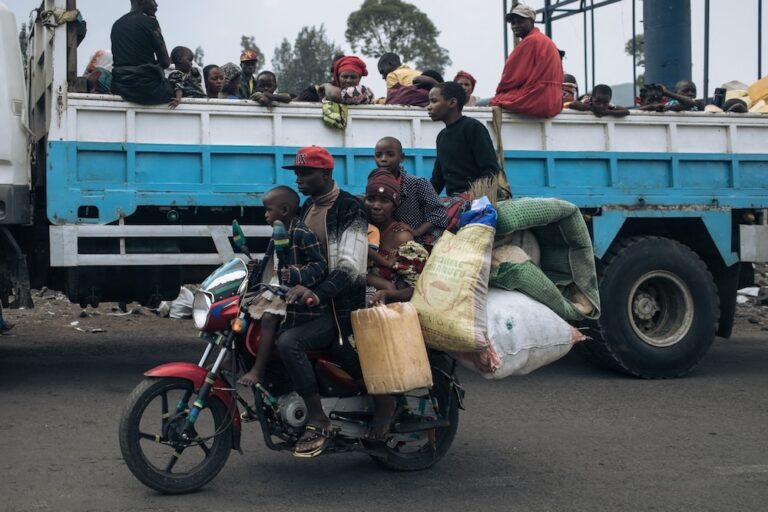(JED/IFEX) – The following is a 10 August 2006 JED statement: JED was surprised by the 10 August 2006 press release published by the office of the High Media Authority (Haute Autorité des Médias, HAM). This press release prohibits the broadcast of live phone-in programmes and live reports of public demonstrations. After HAM’s executive board […]
(JED/IFEX) – The following is a 10 August 2006 JED statement:
JED was surprised by the 10 August 2006 press release published by the office of the High Media Authority (Haute Autorité des Médias, HAM). This press release prohibits the broadcast of live phone-in programmes and live reports of public demonstrations.
After HAM’s executive board held an “extraordinary meeting” on 9 August, its president, Modeste Mutinga, signed a press release which reads as follows: in the ultimate goal of safeguarding peace and national harmony during this election period . . . political phone-in programmes are suspended until the authority decides otherwise” and that “live reports and taped reports of popular marches or any other public political demonstration are also suspended.”
JED shares HAM’s concern for safeguarding peace and national harmony during this election period, but is also concerned because of the threats that these measures exert on press freedom. These measures remind us of the 1 July 2005 unilateral suspension of the privately-owned RAGA TV station by the same HAM because the station covered live demonstrations in Kinshasa on 30 June 2005.
As a matter of fact, articles 23 and 24 of DRC’s constitution guarantee the freedom of expression as well as the right of every individual to information. The same constitution does not restrict these rights, except when it pertains to respecting the law, public order, accepted standards of behaviour or the rights of others.
Furthermore, article 8 of the 22 June 1996 Law N° 002/96, which outlines the application of press freedom, states that: “Everyone has got the right to freedom of opinion and expression. This right is understood as the right to inform, be informed, have one’s opinions and feelings and to communicate them without any restriction, whatever the means utilised, while respecting the law, public order, other’s rights and accepted standards of behaviour.”
Consequently, JED denounces any new attempt to limit DR Congo’s media during this election period, particularly since the whole international press corps operating in DR Congo has the freedom to cover all the events occurring in this country.
JED asserts that:
Firstly, political public demonstrations and popular marches – permitted or prohibited – constitute, even during the election period, events of public interest that the media have the right to cover. The government or any other public institution, for that matter, is not mandated to decide, through media regulation, how these events should be covered by the media (i.e. as live, or taped reports, news flashes, etc).
Second, no law in DR Congo prohibits coverage of live and taped reports. Therefore, HAM’s 9 August press release carries no power to suspend what the country’s constitution and laws on the press allow with respect to freedom of expression.
Tshivis T. Tshivuadi
Secretary-General
D. M’Baya Tshimanga
President


